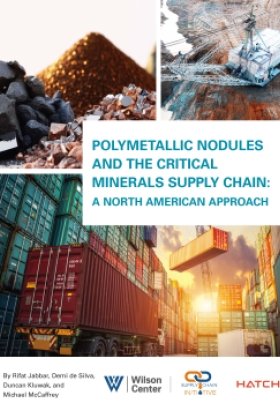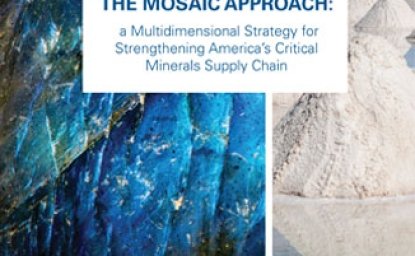Polymetallic Nodules and the Critical Minerals Supply Chain: A North American Approach

Polymetallic Nodules and the Critical Minerals Supply Chain: A North American Approach
By Rifat Jabbar, Demi de Silva, Duncan Kluwak, and Michael McCaffrey
- Critical minerals supply chains are being tested by the dramatic expansion of demand from the energy transition.
- China’s dominance of the supply chain, especially in refining and processing is of profound concern.
- Deep-sea mining offers an alternative source of minerals from polymetallic nodules found on the sea floor.
- It is imperative that the processing and refining of critical minerals is located in jurisdictions friendly to the United States.
- A number of North American states and provinces offer the potential for bringing refining closer to home.
Critical minerals play an essential role in the development of North America’s technological and economic landscape. While the global demand for these critical minerals is forecasted to drastically increase over the next decade, current known reserves will not be sufficient to meet the anticipated demand for these minerals, leading to a forecasted global deficit. In addition to this, most of the extraction and processing of critical minerals such as nickel, cobalt, and rare earth elements currently occurs outside North America.
Deep-sea mining is a potential pathway to establish a resilient supply chain for critical minerals in North America. However, additional research is still required to fully understand the environmental impact and develop the technology towards commercialization. Three types of deep-sea deposits are of economic interest: polymetallic nodules, polymetallic massive sulfides, and cobalt-rich ferromanganese crusts. The extraction of nodules has been the most examined from technical and economic feasibility perspectives.
Once removed from the seabed, nodules will have to be transported to onshore facilities for processing to extract metals such as nickel and cobalt. At present, a two-stage approach consisting of a combination of pyrometallurgical (thermal treatment), and hydrometallurgical (chemical treatment) steps offers the greatest potential for commercial-scale processing.
There are several countries with existing smelting facilities, but the primary concern is that none are in North America, and most countries with these facilities do not have a critical minerals trade agreement with the United States. Chinese refineries are competitively positioned for the domestic electric vehicle battery industry. Many of these facilities produce nickel in sulfate form, which is preferred by precursor cathode active material producers over the metal form commonly produced by the majority of refineries outside of China.
Existing facilities in other countries could be leveraged to accelerate the production timeline of critical minerals from polymetallic nodules at a lower capital expense. However, available capacity and the logistical requirements associated with these facilities could necessitate the development of facilities in North America. While this comes at a higher cost, it would greatly reduce supply chain risk. Localizing processing capabilities in North America can also offer many advantages, such as a reduced carbon footprint from leveraging renewable energy sources and making products more directly accessible to the domestic market. There are several jurisdictions across the continent that can offer the synergies needed for localization and help to build a resilient supply chain for critical minerals.



